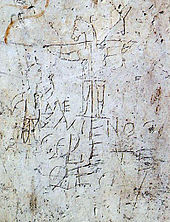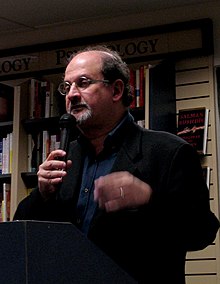This is an old revision of this page, as edited by Radagast83 (talk | contribs) at 05:39, 2 January 2010 (Removing vandalism). The present address (URL) is a permanent link to this revision, which may differ significantly from the current revision.
Revision as of 05:39, 2 January 2010 by Radagast83 (talk | contribs) (Removing vandalism)(diff) ← Previous revision | Latest revision (diff) | Newer revision → (diff) For other uses, see Blasphemy (disambiguation).Blasphemy is irreverence toward holy personages, religious artifacts, customs, and beliefs. The Abrahamic religions condemn blasphemy vehemently. Some countries have laws to punish blasphemy. Some countries have laws to give redress to those who are offended by blasphemy. Those laws may discourage blasphemy as a matter of blasphemous libel, vilification of religion, religious insult, or hate speech. The idea of blasphemy makes the word amenable to colloquial usage.
History
The word "blasphemy" came via Middle English blasfemen and Old French blasfemer and Late Latin blasphemare from Greek βλασφημέω, from βλάπτω = "I injure" and φήμη = "reputation". From blasphemare also came Old French blasmer, from which English "blame" came.
Blasphemy laws
Main article: Blasphemy lawCountries use blasphemy laws to victimize non-members of, and dissident members of, the ruling sect or cult. Countries with a state religion are the most punitive users of blasphemy laws.
Blasphemy in Judaism
In the third book of the Torah, Leviticus 24:16 states that those who speak blasphemy "shall surely be put to death", see also List of capital crimes in the Torah.
Blasphemy in Christianity

Christian theology condemns blasphemy. One verse from the Bible that directly concerns the sin reads as follows:
Thou shalt not take the name of the LORD thy God in vain; for the LORD will not hold him guiltless that taketh his name in vain. (Exodus 20:7 KJV)
In addition, it is spoken of in the Luke 12:10, where blaspheming the Holy Spirit is spoken of as unforgivable - the eternal sin. However, there is dispute over what form this blasphemy may take and whether it qualifies as blasphemy in the conventional sense.
Blasphemy has been condemned as a serious, or even the most serious, sin by the major creeds and Church theologians.
- Thomas Aquinas says that “it is clear that blasphemy, which is a sin committed directly against God, is more grave than murder, which is a sin against one's neighbor. … it is called the most grievous sin, for as much as it makes every sin more grievous.”
- The Book of Concord calls blasphemy “the greatest sin that can be outwardly committed”.
- The Baptist Confession of Faith says: “Therefore, to swear vainly or rashly by the glorious and awesome name of God…is sinful, and to be regarded with disgust and detestation. …For by rash, false, and vain oaths, the Lord is provoked and because of them this land mourns.”
- The Heidelberg Catechism answers question 100 about blasphemy by stating that “no sin is greater or provokes God's wrath more than the blaspheming of His Name”.
- The Westminster Larger Catechism explains that “The sins forbidden in the third commandment are, the abuse of it in an ignorant, vain, irreverent, profane...mentioning...by blasphemy...to profane jests, ...vain janglings, ...to charms or sinful lusts and practices.”
- Calvin found it intolerable “when a person is accused of blasphemy, to lay the blame on the ebullition of passion, as if God were to endure the penalty whenever we are provoked.”
The Catholic Encyclopedia has a more extensive article on blasphemy.
Catholic prayers and reparations for blasphemy
In the Catholic Church, there are specific prayers and devotions as Acts of Reparation for blasphemy. For instance, The Golden Arrow Holy Face Devotion (Prayer) first introduced by Sister Marie of St Peter in 1844 is recited "in a spirit of reparation for blasphemy". This devotion (started by Sister Marie and then promoted by the Venerable Leo Dupont) was approved by Pope Leo XIII in 1885. The Raccolta Catholic prayer book includes a number of such prayers. The Five First Saturdays devotions are done with the intention in the heart of making reparation to the Blessed Mother for blasphemies against her, her name and her holy initiatives.
The Holy See has specific "Pontifical organizations" for the purpose of the reparation of blasphemy through Acts of Reparation to Jesus Christ, e.g. the Pontifical Congregation of the Benedictine Sisters of the Reparation of the Holy Face.

Blasphemy in Islam
Main article: Islam and blasphemyBlasphemy in Islam is irreverent behavior toward holy personages, religious artifacts, customs, and beliefs that Muslims respect. The penalties for such behavior vary by jurisdiction, and can include fines, imprisonment, flogging, amputation or beheading.
Blasphemy and the United Nations
Main article: Blasphemy and the United NationsIn the early 21st century, blasphemy became an issue for the United Nations. The General Assembly passed several resolutions which called upon the world to take action against the "defamation of religions."
Colloquial usage
Blasphemy has been used to mean irreverence in a non-religious context. Sir Francis Bacon uses blasphemy in this way in Advancement of Learning, where he speaks of "blasphemy against teaching". Blasphemy may be used as a substitute for profanity or cursing as it is used in this sentence: "With much hammering and blasphemy, the locomotive's replacement spring was finally fitted."
In contemporary language, the notion of blasphemy is often used ironically, as a form of hyperbole. As an example, one might express that doubting Misplaced Pages as a good source of information is blasphemous. This usage has garnered some interest among linguists recently, and the word 'blasphemy' is a common case used for illustrative purposes.
See also
- Eternal sin
- Freedom of speech versus blasphemy
- Heresy
- Impiety
- Minced oath
- Profanity
- Gerard Reve
- Sacrilege
- Verbal offence
- Victimless crime
References
- http://dictionary.reference.com/browse/blasphemy
- See Blasphemy law.
- Kerr, ine (9 July 2009). "Libel and blasphemy bill passed by the Dail". Independent.ie. Retrieved 17 November 2009.
- http://www.austlii.edu.au/au/legis/qld/consol_act/aa1991204/s124a.html
- http://www.police.vic.gov.au/content.asp?document_id=23370
- European Commission for Democracy through Law (Venice Commission), Report on the relationship between freedom of expression and freedom of religion: the issue of regulation and prosecution of blasphemy, religious insult and incitement to religious hatred, 17-18 October 2008, Doc. No. CDL-AD(2008)026
- See Blasphemy law and Hate speech.
- http://www.religiouswatch.com/rwworld.htm
- http://www.christianpost.com/article/20091113/100-groups-oppose-u-n-defamation-of-religions-proposals/index.html
- http://www.iheu.org/united-nations-will-violate-human-rights-says-new-report-religious-freedoms
- "Muslim scholar says Scrap blasphemy laws which bring shame on Islam and Pakistan". Herald Malaysia Online. 11 August 2009. Retrieved 3 September 2009.
- http://www.uscirf.gov/index.php?option=com_content&task=view&id=1414&Itemid=1 Annual Report of the United States Commission on International Religious Freedom May 2009 (Pakistan, etc.).
- http://www.unhchr.ch/Huridocda/Huridoca.nsf/TestFrame/af783bb51170854380256739004faac4?Opendocument A call upon states to work toward abolishing the juvenile death penalty
- http://report2009.amnesty.org/en/regions/asia-pacific/indonesia
- http://www.christianpost.com/article/20091113/100-groups-oppose-u-n-defamation-of-religions-proposals/index.html
- Thomas Aquinas: Summa Theologica 2:2, q. 13.
- The Book of Concord The Large Catechism, §55.
- The Baptist Confession of Faith Ch. 23, §2-3.
- The Heidelberg Cathechism Q. 100.
- Westminster Larger Cathechism Q. 113.
- Jean Calvin: Harmony of the Law vol. 4. Lev. 24:10.
- Act of Reparation for Blasphemies Uttered Against the Holy Name, Righting Wrongs Through Prayer By Scott P. Richert, About.com
- * Dorothy Scallan. The Holy Man of Tours. (1990) ISBN 0895553902
- Joseph P. Christopher et al., 2003 The Raccolta, St Athanasius Press ISBN 978-0970652669
- Letter for 50th anniversary of the Benedictine Sisters of Reparation of the Holy Face, 2000 Vatican archives
- See the articles about Islamic jurisdictions under Blasphemy law.
- http://www.islamicvoice.com/April2006/QuestionHour-DrZakirNaik/
- http://daccess-ods.un.org/access.nsf/Get?Open&DS=A/RES/60/150&Lang=E A/RES/60/150
- http://daccess-ods.un.org/access.nsf/Get?Open&DS=A/60/PV.64&Lang=E Vote on 16 December 2005 (A/60/PV.64)
- http://daccess-ods.un.org/access.nsf/Get?Open&DS=A/RES/61/164&Lang=E A/RES/61/164
- http://daccess-ods.un.org/access.nsf/Get?Open&DS=A/61/PV.81&Lang=E Vote on 19 December 2006
- http://daccess-ods.un.org/access.nsf/Get?Open&DS=A/RES/62/154&Lang=E A/RES/62/154
- http://daccess-ods.un.org/access.nsf/Get?Open&DS=A/62/PV.76&Lang=E Vote on 18 December 2007
- http://daccess-ods.un.org/access.nsf/Get?Open&DS=A/RES/63/171&Lang=E A/RES/63/171
- http://daccess-ods.un.org/access.nsf/Get?Open&DS=A/63/PV.70&Lang=E Vote on 18 December 2008
- Recanati 1995; Carston 1997, 1999, 2000; Sperber & Wilson 1998; Glucksberg 2001; Wilson & Sperber 2002.
- "Relevance and Lexical Pragmatics" (DOC). UCL Dept of Phonetics and Linguistics. Retrieved 2008-05-12.
Further reading
- Maledicta: The International Journal of Verbal Aggression (ISSN US 0363-3659)
- Levy, L. Blasphemy. Chapel Hill, 1993.
- Comprehensive academic study comparing global legal approaches to blasphemy in light of the Jyllands-Posten controversy
- Dartevelle, P., S Borg, Denis, Ph., Robyn, J. (eds.). Blasphèmes et libertés. Paris: CERF, 1993
- Plate, S. Brent Blasphemy: Art that Offends (London: Black Dog Publishing, 2006)
External links
- The Rational Response Squad: The Blasphemy Challenge
- A More4 news film report on how insulting the prophet Mohammed in Pakistan is a capital offence, and defiling the Koran carries life imprisonment.
- review of laws relating to blasphemy and sacrilege in various jurisdictions
- Catholic Encyclopedia - Blasphemy
- Jewish Encyclopedia - Blasphemy